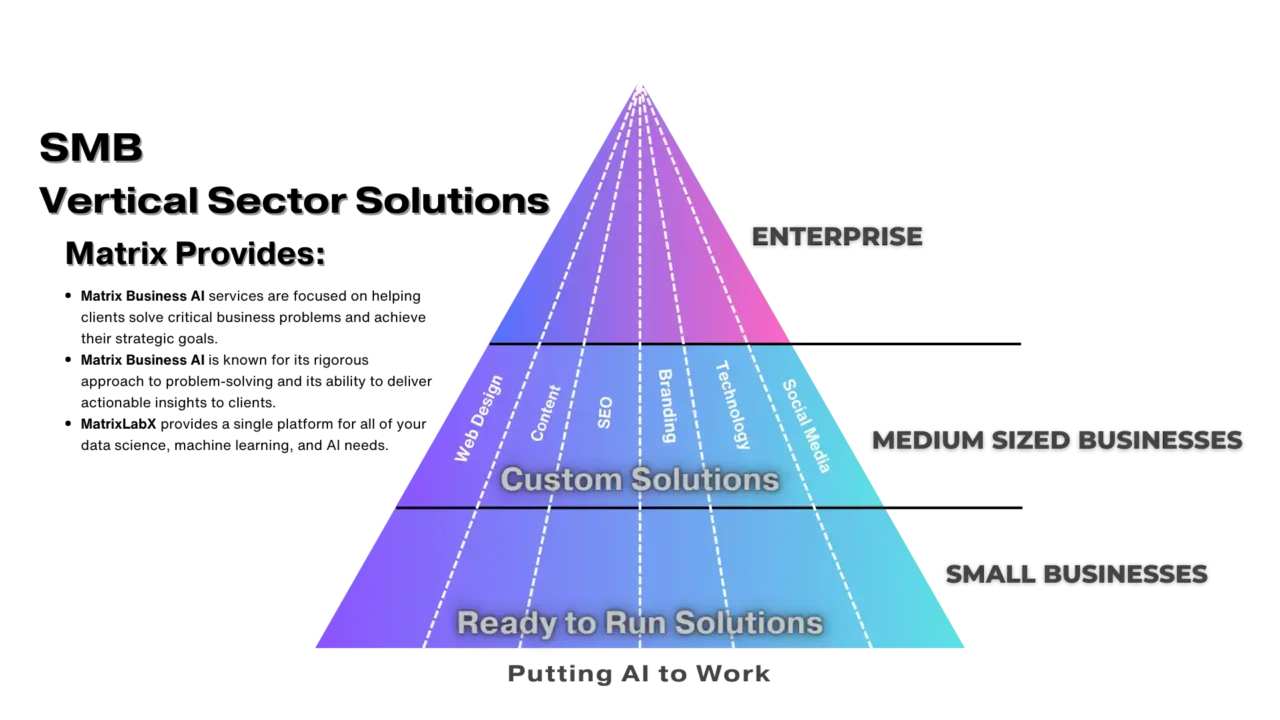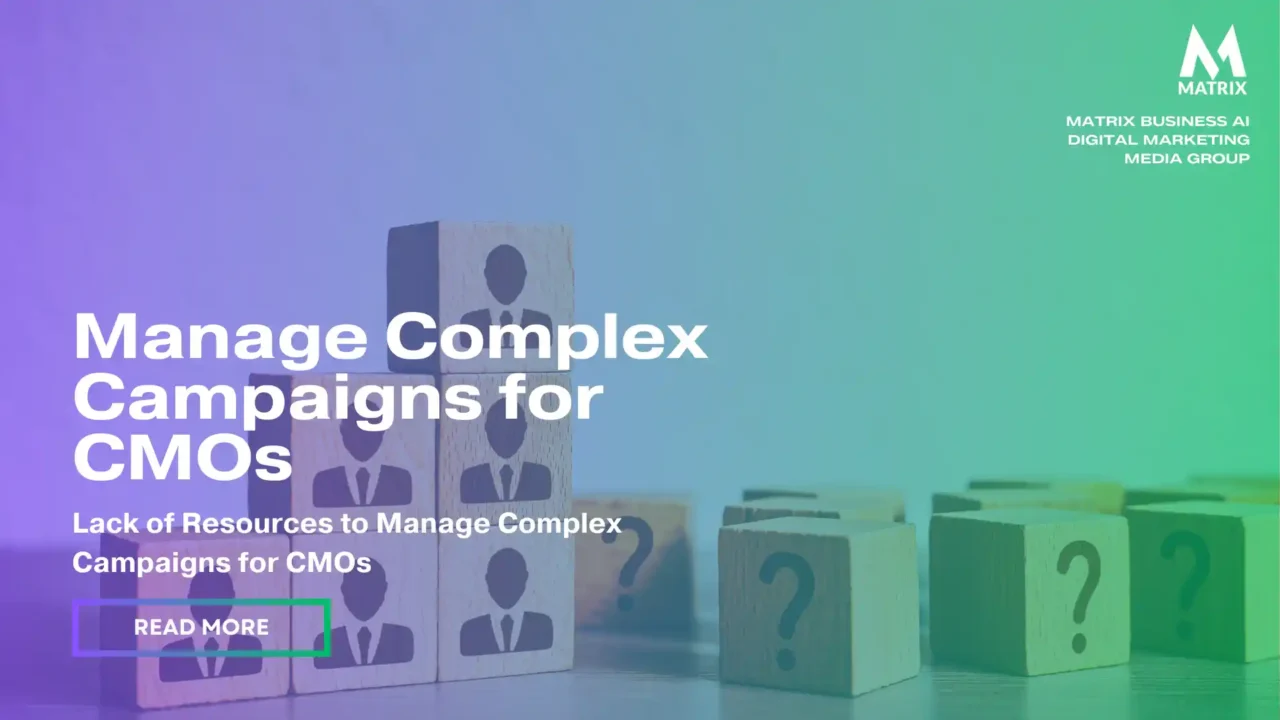Lack of Resources for Managing Complex Marketing Campaigns for CMOs
Learn About the Lack of Resources for Managing Complex Marketing Campaigns for CMOs
The Lack of Resources to Manage Complex Campaigns
In today’s digital age, marketing campaigns have become increasingly complex and challenging to manage effectively.
CMOs and marketing teams face many challenges, including limited resources, fragmented technology landscapes, and the need to deliver measurable results.
This lack of resources can significantly impact the success of marketing campaigns, leading to missed opportunities, wasted budgets, and frustrated stakeholders.
This article explores CMOs and marketing teams’ challenges in managing complex campaigns. It discusses the benefits of using an AI digital marketing agency like Matrix Marketing Group to overcome these challenges. We will also provide real-world examples of how AI can improve marketing ROI and achieve better campaign results. Rethinking AI Website Design in the Age of the Algorithm
In this article, we will:
- Explore the challenges faced by CMOs and marketing teams in managing complex campaigns
- Discuss the benefits of using an AI digital marketing agency like Matrix Marketing Group
- Provide real-world examples of how AI can be used to improve marketing ROI and achieve better campaign results
Interesting Stats about CMOs’ Lack of Resources to Manage Complex Campaigns
- 60% of CMOs say they lack the resources to manage complex marketing campaigns effectively. (Source: Gartner)
- 55% of marketing teams are struggling to keep up with the pace of change in marketing technology. (Source: Marketo)
- 40% of marketing budgets are wasted on ineffective campaigns. (Source: Forrester)
- Only 20% of CMOs are satisfied with their current marketing ROI. (Source: CMO Council)
Trends that Very Few People are Talking About
- The rise of AI-powered marketing. AI can automate many marketing tasks, such as content creation, campaign management, and lead generation. This can free up CMOs and marketing teams to focus on more strategic initiatives.
- The convergence of marketing and sales. Marketing and sales are becoming increasingly intertwined, and CMOs are more important in driving revenue.
- The importance of customer experience. Customers are likelier to do business with companies that provide a positive customer experience. CMOs must focus on creating a seamless and personalized customer experience across all channels.
CMOs’ Pains and Desires Regarding Poor Marketing ROI
CMOs are under increasing pressure to deliver measurable results from their marketing efforts. However, many CMOs are struggling to achieve a positive marketing ROI due to a variety of factors, including
Common Pains:
- Lack of resources to manage complex campaigns effectively
- Fragmented technology landscapes make it difficult to track and measure marketing performance
- Difficulty in demonstrating the impact of marketing on revenue
- Wasted marketing budgets on ineffective campaigns
- Frustrated stakeholders who are not seeing the desired results from their marketing investment
Common Desires:
- A better understanding of how to measure marketing ROI
- More efficient and effective marketing campaigns
- Improved alignment between marketing and sales
- A more personalized and relevant customer experience
- Increased brand awareness and lead generation
Lack of Resources to Manage Complex Campaigns: Challenges and Solutions
Marketing campaigns have become increasingly complex, and many companies lack the resources to manage them effectively.
This can lead to missed opportunities, wasted budgets, and frustrated stakeholders.
Common Challenges Faced by Marketing Teams
- Limited resources: Many marketing teams are understaffed and underfunded, making it difficult to manage complex campaigns effectively.
- Fragmented technology landscapes: Many companies use various marketing technologies, making tracking and measuring campaign performance difficult.
- Difficulty demonstrating ROI: It can be difficult to demonstrate the impact of marketing on revenue, which can make it difficult to justify marketing spend.
- Wasted marketing budgets: Many companies waste marketing budgets on ineffective campaigns.
- Frustrated stakeholders: Stakeholders not seeing the desired results from their marketing investment can become frustrated.
Benefits of Using an AI Digital Marketing Agency

AI digital marketing agencies can help companies overcome the challenges of managing complex campaigns. Here are some of the benefits of using an AI digital marketing agency:
- Improved efficiency: AI can automate many marketing tasks, such as content creation, campaign management, and lead generation. This can free up marketing teams to focus on more strategic initiatives. Content Translation Services: A Competitive Advantage for Your Business
- Better targeting: AI can be used to target marketing campaigns more effectively. This can help companies reach the right audience with the right message.
- Increased personalization: AI can be used to personalize marketing campaigns for each customer.
- Improved measurement: AI can track and measure marketing performance in real time.
- Better ROI: AI can help companies achieve a better marketing ROI.
Case Studies
Here are some case studies of companies that have used AI digital marketing agencies to improve their marketing results:
- A large retailer used an AI digital marketing agency to automate email marketing campaigns. The agency used AI to segment the retailer’s customer list and send personalized emails to each segment. This resulted in a 20% increase in email open rates and a 15% increase in click-through rates.
- A small business used an AI digital marketing agency to create a chatbot to answer customer questions. The chatbot answered 80% of customer questions without human intervention. This resulted in a 25% decrease in customer support calls.
- A nonprofit organization used an AI digital marketing agency to create a personalized donor experience. The agency used AI to segment the organization’s donor list and send personalized thank-you emails to each segment, resulting in a 10% increase in donor retention.
Navigating Complex Campaigns with Limited Resources: A Marketing Manager’s Guide

In today’s digital landscape, social media managers often face the challenge of managing complex campaigns with limited resources.
This can be a daunting task, as it requires a strategic approach, creative thinking, and a deep understanding of the platform’s algorithms.
Why is it challenging?
The rapid evolution of social media platforms, coupled with the ever-changing consumer behavior, makes it increasingly difficult for social media managers to keep up.
Additionally, creating engaging content, managing multiple platforms, and tracking campaign performance can be overwhelming, especially with limited resources.
Where can a marketing manager look for help?
To navigate these challenges effectively, social media managers can seek support from various sources.
Collaboration with cross-functional teams, such as content creators, graphic designers, and data analysts, can provide valuable insights and assistance. Additionally, utilizing social media management tools and platforms can streamline tasks, automate processes, and provide data-driven insights.
How can you make the most of limited resources?
Prioritizing tasks, setting realistic goals, and focusing on key performance indicators (KPIs) can help social media managers make the most of their limited resources. Repurposing content across multiple platforms, creating user-generated content, and leveraging influencer partnerships can also extend reach and engagement without breaking the bank.
Managing complex social media campaigns with limited resources requires a combination of strategic planning, creative execution, and data-driven insights. By leveraging available tools, seeking support from cross-functional teams, and implementing effective strategies, social media managers can overcome these challenges and achieve successful campaign outcomes.
Overcoming Complex Marketing Campaigns with Limited Resources: Real-World Use Cases
In today’s competitive business landscape, marketing campaigns have become increasingly complex, requiring significant resources to execute effectively.
However, many companies, especially small businesses and startups, often face the challenge of limited resources to manage such campaigns.
This blog explores three real-world use cases where organizations overcame this challenge by leveraging AI digital marketing agencies to achieve remarkable results.
Use Case 1: Streamlined Content Creation and Personalization
- Attention: Imagine a marketing team struggling to create engaging content that resonates with diverse customer segments due to limited resources.
- Interest: An AI digital marketing agency can employ natural language generation (NLG) technology to automate content creation, ensuring consistency and quality while saving time and effort.
- Desire: The agency uses AI-powered tools to analyze customer data, derive insights, and personalize content for each segment. This approach increases engagement, higher conversion rates, and improves customer satisfaction.
Use Case 2: Enhanced Targeting and Efficiency
- Attention: A small business with a limited marketing budget must target its campaigns effectively to maximize ROI.
- Interest: The AI digital marketing agency leverages machine learning algorithms to analyze customer behavior, identify patterns, and optimize targeting strategies.
- Desire: The agency creates highly targeted campaigns that reach the right audience at the right time, leading to increased conversions and reduced wasted ad spend.
Use Case 3: Automated Lead Generation and Nurturing
- Attention: A nonprofit organization struggles to generate and nurture leads due to a lack of dedicated staff.
- Interest: The AI digital marketing agency implements AI-powered chatbots to engage website visitors, answer inquiries, and capture leads 24/7.
- Desire: The organization experiences a significant increase in lead generation, improved lead qualification, and enhanced donor engagement.
Crafting Effective Resources for Complex Campaign Management and Enhancing Search Volume Results
Step 1: Understanding the Target Audience
To understand your target audience, you must identify their demographics, psychographics, pain points, and online behavior. It would be best if you also researched their search habits to gain insights into their information-seeking patterns. By understanding your target audience, you can create content and campaigns that are relevant and engaging to them.
- Identify your target audience: Thoroughly understand their demographics, psychographics, pain points, and online behavior.
- Research their search habits: Analyze their search queries, keywords, and platforms to gain insights into their information-seeking patterns.
Step 2: Defining Campaign Goals
- Set clear objectives: Outline specific, measurable, achievable, relevant, and time-bound goals for your campaign.
- Align with business objectives: Ensure that your campaign goals align with the overall business objectives and contribute to the organization’s growth.
- 1. Understand your broader business objectives. What does your company want to achieve overall (e.g., increase sales, expand into a new market)?
- 2. Align your campaign to a specific business goal. How will this campaign specifically contribute to the bigger picture?
- 3. Make your goals SMART. Ensure they are Specific, Measurable, Achievable, Relevant, and Time-bound (e.g., “Increase website leads by 15% in the next quarter”).
Step 3: Content Strategy and Creation
A strong content strategy and creation process is key to reaching your target audience and achieving your marketing goals. It helps you attract and engage the right people with valuable, informative content. By planning and creating content that resonates, you can build brand awareness, establish yourself as an authority, and ultimately drive conversions and sales.
- Create valuable content: Develop high-quality, informative, and engaging content that addresses your target audience’s needs and pain points.
- Optimize for search engines: Incorporate relevant keywords and phrases into your content while maintaining readability and authenticity.
- Diversify content formats: Utilize various content formats such as blog posts, infographics, videos, and podcasts to cater to different learning preferences.
Step 4: Resource Development
- Develop comprehensive guides and tutorials: Create in-depth guides and tutorials that provide step-by-step instructions for managing complex campaigns effectively.
- Case studies and success stories: Share real-world examples of successful campaigns to demonstrate the practical application of your resources.
- Interactive tools and calculators: Offer interactive tools and calculators to help users estimate campaign costs, ROI, and other metrics.
- Assess Your Needs: Identify the resources your marketing operations team currently lacks. This includes personnel (skill sets needed), technology (software/tools), budget, and any potential external partners.
- Prioritize and Set Goals: Clearly define what you want to achieve with additional resources and prioritize those needs. Consider the biggest impact items first.
Step 5: Distribution and Promotion
- Leverage multiple channels: Distribute your resources through various channels such as your website, social media, email marketing, and paid advertising.
- Collaborate with influencers: Partner with industry influencers and experts to amplify your reach and credibility.
- Monitor and analyze performance: Continuously monitor the performance of your resources and make data-driven adjustments to improve their effectiveness.
Step 6: Evolving with User Behavior and Search Trends
- Stay informed about industry trends: Keep up with the latest developments in your industry, search engine algorithms, and user behavior patterns.
- Regularly update your resources: Periodically review and update your resources to ensure they remain relevant and aligned with evolving user needs.
- Conduct user research: Continuously conduct user research to gather feedback and understand how your resources can be improved.
Track Campaigns with Google’s Looker
Here’s a breakdown of how to use Google Looker (formerly Google Data Studio) to set up your omnichannel dashboard. I’ll include the important concepts and steps:
Prerequisites:
- Google Looker Account: You’ll need an active Google Looker account.
- Data Sources: Your omnichannel data needs to be accessible to Looker. Common sources include:
- Google Analytics (for web data)
- Google Ads, Facebook Ads, etc. (for advertising data)
- Your CRM system (e.g., Salesforce)
- Marketing automation platform (e.g., HubSpot)
Steps:
- Connect Data Sources:
- Go to Looker Studio and select “Add a Data Source.”
- Choose the relevant connectors for your data sources and follow the setup process.
- Explore Data (Optional):
- Looker has an “Explore” feature that lets you examine your data and familiarize yourself with the available metrics and dimensions. This can help with the dashboard design process.
- Create a New Report:
- Click “Create New” and then “Report.”
- Design Your Dashboard:
- Use Looker Studio’s drag-and-drop interface to add visualizations. Consider:
- Scorecards: To highlight key performance indicators (KPIs) like total leads, conversions, and ROI.
- Time Series Charts: Track performance over time across different channels.
- Tables: For detailed breakdowns by channel or campaign.
- Geo Maps: Visualize performance by location.
- Use Looker Studio’s drag-and-drop interface to add visualizations. Consider:
- Data Blending (If Needed):
Important Considerations:
- KPIs: Clearly define the key metrics that matter for your omnichannel strategy.
- Audience: Consider who will use the dashboard and tailor the design accordingly.
- Customization: Looker Studio’s styling options align the dashboard with your brand.
Additional Tips
- Leverage Templates: Looker Studio offers templates to help you get started.
- Community Resources: Looker has a helpful community and online resources.
Let me know if you’d like more detailed instructions on a specific part of the process!
Master Complex Campaigns with Matrix Marketing Group
Unleash Your Sales Channel PotentialSub-title: Overcoming Limited Resources through AI-Powered Solutions
In today’s digital era, managing complex marketing campaigns with limited resources can be a daunting task. But what if there was a solution that could not only streamline your processes but also enhance your sales channel metrics?
Matrix Marketing Group presents a game-changing approach, leveraging advanced AI technology to revolutionize campaign management. How to Use AI Digital Marketing to Transform Your Marketing Results
Matrix Marketing Group’s AI-powered solutions are designed to address the challenges faced by businesses with limited resources. By automating repetitive tasks, optimizing targeting strategies, and personalizing content, our services empower businesses to achieve remarkable results.
<iframe id="vectorsurvEmbedded" title="Embedded VectorSurv Visualizations" width="1000" height="700" src="https://maps.vectorsurv.org/arbo/?&shapes=true&lat=34.07&lng=-118.13&zoom=8.9&start=0&end=85"></iframe>
